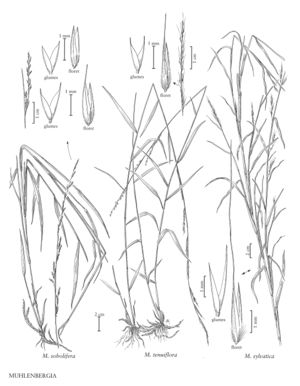Difference between revisions of "Muhlenbergia tenuiflora"
FNA>Volume Importer |
imported>Volume Importer |
||
| (8 intermediate revisions by 2 users not shown) | |||
| Line 4: | Line 4: | ||
|publications= | |publications= | ||
|common_names=Slimflowered muhly;Muhlenbergie tenue | |common_names=Slimflowered muhly;Muhlenbergie tenue | ||
| + | |special_status={{Treatment/ID/Special_status | ||
| + | |code=E | ||
| + | |label=Endemic | ||
| + | }} | ||
|basionyms= | |basionyms= | ||
|synonyms={{Treatment/ID/Synonym | |synonyms={{Treatment/ID/Synonym | ||
|name=Muhlenbergia tenuiflora var. variabilis | |name=Muhlenbergia tenuiflora var. variabilis | ||
| − | |authority= | + | |authority= |
| + | |rank=variety | ||
}} | }} | ||
|hierarchy=Poaceae;Poaceae subfam. Chloridoideae;Poaceae tribe Cynodonteae;Muhlenbergia;Muhlenbergia tenuiflora | |hierarchy=Poaceae;Poaceae subfam. Chloridoideae;Poaceae tribe Cynodonteae;Muhlenbergia;Muhlenbergia tenuiflora | ||
| Line 19: | Line 24: | ||
-->{{Treatment/Body | -->{{Treatment/Body | ||
| − | |distribution=Conn.;N.J.;N.Y.;W.Va.;Del.;D.C;Wis.;Ont.;Que.;Nebr.;Okla.;N.H.;Tenn.;N.C.;S.C.;Pa.;R.I.;Va.;Ala.;Mass.;Vt.;Ark.;Ill.;Ga.;Ind.;Iowa;Md.;Ohio;Mo.;Mich.;Miss.;Ky. | + | |distribution=Conn.;N.J.;N.Y.;W.Va.;Del.;D.C.;Wis.;Ont.;Que.;Nebr.;Okla.;N.H.;Tenn.;N.C.;S.C.;Pa.;R.I.;Va.;Ala.;Mass.;Vt.;Ark.;Ill.;Ga.;Ind.;Iowa;Md.;Ohio;Mo.;Mich.;Miss.;Ky. |
| − | |discussion=<p>Muhlenbergia tenuiflora grows only in the Flora region, usually being found on sandy or rocky slopes derived from sandstone, chert, or limestone formations, in mixed hardwood and oak-hickory forests, at elevations of 40-1500 m. It resembles the Asiatic species M. curviaristata (Ohwi) Ohwi.</p> | + | |discussion=<p><i>Muhlenbergia tenuiflora</i> grows only in the Flora region, usually being found on sandy or rocky slopes derived from sandstone, chert, or limestone formations, in mixed hardwood and oak-hickory forests, at elevations of 40-1500 m. It resembles the Asiatic species M. curviaristata (Ohwi) Ohwi.</p> |
|tables= | |tables= | ||
|references= | |references= | ||
| Line 29: | Line 34: | ||
-->{{#Taxon: | -->{{#Taxon: | ||
name=Muhlenbergia tenuiflora | name=Muhlenbergia tenuiflora | ||
| − | |||
|authority=(Willd.) Britton, Sterns & Poggenb. | |authority=(Willd.) Britton, Sterns & Poggenb. | ||
|rank=species | |rank=species | ||
| Line 36: | Line 40: | ||
|basionyms= | |basionyms= | ||
|family=Poaceae | |family=Poaceae | ||
| − | |distribution=Conn.;N.J.;N.Y.;W.Va.;Del.;D.C;Wis.;Ont.;Que.;Nebr.;Okla.;N.H.;Tenn.;N.C.;S.C.;Pa.;R.I.;Va.;Ala.;Mass.;Vt.;Ark.;Ill.;Ga.;Ind.;Iowa;Md.;Ohio;Mo.;Mich.;Miss.;Ky. | + | |illustrator=Linda A. Vorobik;Annaliese Miller |
| + | |illustration copyright=Utah State University | ||
| + | |distribution=Conn.;N.J.;N.Y.;W.Va.;Del.;D.C.;Wis.;Ont.;Que.;Nebr.;Okla.;N.H.;Tenn.;N.C.;S.C.;Pa.;R.I.;Va.;Ala.;Mass.;Vt.;Ark.;Ill.;Ga.;Ind.;Iowa;Md.;Ohio;Mo.;Mich.;Miss.;Ky. | ||
|reference=None | |reference=None | ||
|publication title= | |publication title= | ||
|publication year= | |publication year= | ||
| − | |special status= | + | |special status=Endemic |
| − | |source xml=https:// | + | |source xml=https://bitbucket.org/aafc-mbb/fna-data-curation/src/200273ad09963decb8fc72550212de541d86569d/coarse_grained_fna_xml/V25/V25_721.xml |
|subfamily=Poaceae subfam. Chloridoideae | |subfamily=Poaceae subfam. Chloridoideae | ||
|tribe=Poaceae tribe Cynodonteae | |tribe=Poaceae tribe Cynodonteae | ||
Latest revision as of 18:58, 11 May 2021
Plants perennial; rhizomatous, not cespitose. Culms 40-120 cm tall, less than 2 mm thick, erect; internodes mostly pubescent, retrorsely hirsute to strigose below the nodes. Sheaths mostly glabrous, usually pubescent near the base, scabridulous distally; ligules 0.4-1.2 mm, membranous, truncate, ciliolate; blades 6-20 cm long, 4-10(15) mm wide, flat, glabrous and smooth abaxially, occasionally scabridulous adaxially. Panicles usually terminal, 10-33 cm long, 0.2-0.8 cm wide, exserted; branches 1-10 cm, ascending to appressed; pedicels 1-6 mm, strigose. Spikelets 2.6-4.5 mm, overlapping the next spikelet on the branch by 1/4 of its length. Glumes subequal, 1.3-3 mm, shorter than the lemmas, 1-veined (lower glumes rarely 2- or 3-veined), tapering from near the base, bases overlapping, apices scabridulous, acute, unawned or awned, awns to 1 mm; lemmas 2.6-4.5 mm, lanceolate to narrowly lanceolate, usually pubescent on the calluses, lower 1/3 of the midveins, and margins (hairs sometimes restricted to the callus), hairs shorter than 1.2 mm, apices acute or acuminate, usually awned, awns to 12 mm; paleas 2.6-4.5 mm, lanceolate to narrowly lanceolate, shortly pilose on the lower portion, apices acuminate; anthers 1.1-2.2 mm, yellowish. Caryopses 2-2.3 mm, fusiform, brown. 2n = 40.
Distribution
Conn., N.J., N.Y., W.Va., Del., D.C., Wis., Ont., Que., Nebr., Okla., N.H., Tenn., N.C., S.C., Pa., R.I., Va., Ala., Mass., Vt., Ark., Ill., Ga., Ind., Iowa, Md., Ohio, Mo., Mich., Miss., Ky.
Discussion
Muhlenbergia tenuiflora grows only in the Flora region, usually being found on sandy or rocky slopes derived from sandstone, chert, or limestone formations, in mixed hardwood and oak-hickory forests, at elevations of 40-1500 m. It resembles the Asiatic species M. curviaristata (Ohwi) Ohwi.
Selected References
None.
